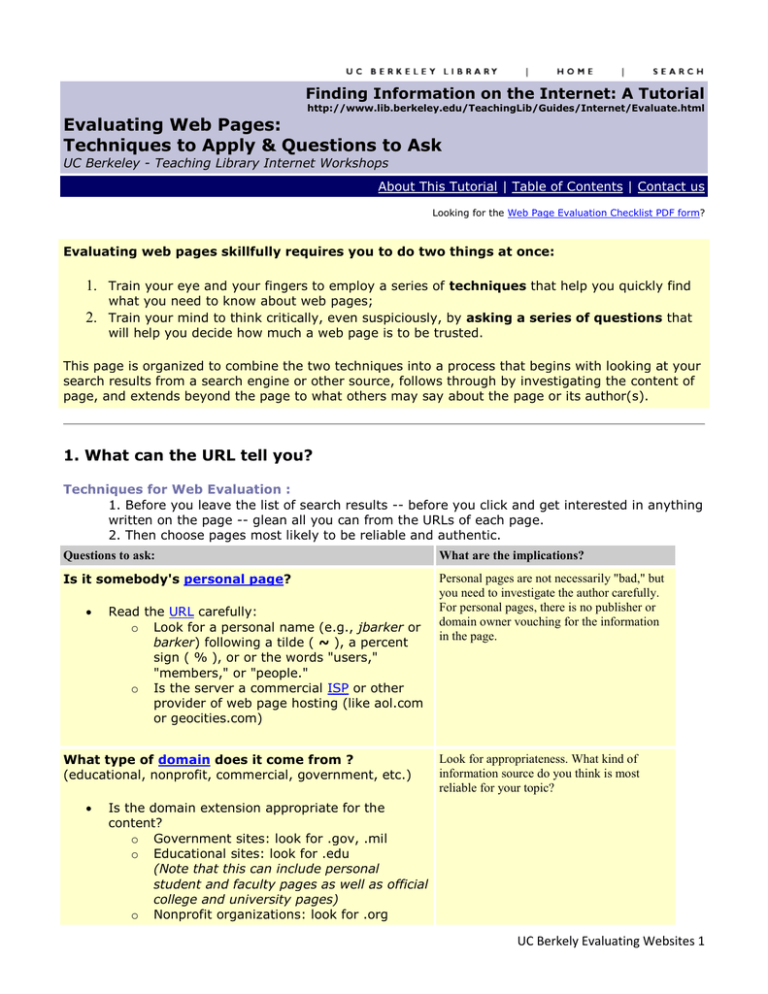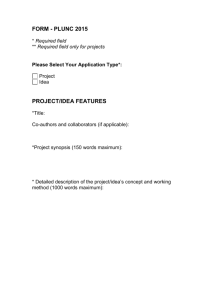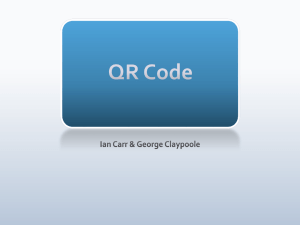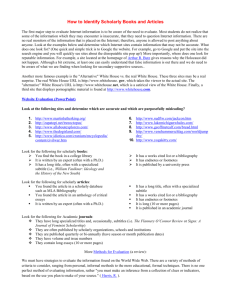Evaluating Websites Detailed Handout UC Berkely
advertisement

Finding Information on the Internet: A Tutorial http://www.lib.berkeley.edu/TeachingLib/Guides/Internet/Evaluate.html Evaluating Web Pages: Techniques to Apply & Questions to Ask UC Berkeley - Teaching Library Internet Workshops About This Tutorial | Table of Contents | Contact us Looking for the Web Page Evaluation Checklist PDF form? Evaluating web pages skillfully requires you to do two things at once: 1. Train your eye and your fingers to employ a series of techniques that help you quickly find 2. what you need to know about web pages; Train your mind to think critically, even suspiciously, by asking a series of questions that will help you decide how much a web page is to be trusted. This page is organized to combine the two techniques into a process that begins with looking at your search results from a search engine or other source, follows through by investigating the content of page, and extends beyond the page to what others may say about the page or its author(s). 1. What can the URL tell you? Techniques for Web Evaluation : 1. Before you leave the list of search results -- before you click and get interested in anything written on the page -- glean all you can from the URLs of each page. 2. Then choose pages most likely to be reliable and authentic. Questions to ask: What are the implications? Is it somebody's personal page? Personal pages are not necessarily "bad," but you need to investigate the author carefully. For personal pages, there is no publisher or domain owner vouching for the information in the page. Read the URL carefully: o Look for a personal name (e.g., jbarker or barker) following a tilde ( ~ ), a percent sign ( % ), or or the words "users," "members," or "people." o Is the server a commercial ISP or other provider of web page hosting (like aol.com or geocities.com) What type of domain does it come from ? (educational, nonprofit, commercial, government, etc.) Look for appropriateness. What kind of information source do you think is most reliable for your topic? Is the domain extension appropriate for the content? o Government sites: look for .gov, .mil o Educational sites: look for .edu (Note that this can include personal student and faculty pages as well as official college and university pages) o Nonprofit organizations: look for .org UC Berkely Evaluating Websites 1 (Note that this is no longer restricted to nonprofits) Many country codes, such as .us, .uk. and .de, are no longer tightly controlled and may be misused. Look at the country code, but also use the techniques in sections 2 and 4 below to see who published the web page. Is it published by an entity that makes sense? Who "published" the page? You can rely more on information that is published by the source: In general, the publisher is the agency or person operating the "server" computer from which the document is issued. o The server is usually named in first portion of the URL (between http:// and the first /) Have you heard of this entity before? Does it correspond to the name of the site? Look for New York Times news from www.nytimes.com Look for health information from any of the agencies of the National Institute of Health on sites with nih somewhere in the domain name. 2. Scan the perimeter of the page, looking for answers to these questions: Techniques for Web Evaluation : 1. Look for links that say "About us," "Philosophy," "Background," "Biography", etc. 2. If you cannot find any links like these, you can often find this kind of information if you Truncate back the URL. INSTRUCTIONS for Truncating back a URL: In the top Location Box, delete the end characters of the URL stopping just before each / (leave the slash). Press enter to see if you can see more about the author or the origins/nature of the site providing the page. Continue this process, one slash (/) at a time, until you reach the first single / which is preceded by the domain name portion. This is the page's server or "publisher." 3. Look for the date "last updated" - usually at the bottom of a web page. Check the date on all the pages on the site. Questions to ask: What are the implications? Who wrote the page? Web pages are created with a purpose in mind by some person or agency or entity. You are looking for someone who claims accountability and responsibility for the content. An e-mail address with no additional information about the author is not sufficient for assessing the author's credentials. If this is all you have, try emailing the author and asking politely for more information about him/her. Look for the name of the author, or the name of the organization, institution, agency, or whatever who is responsible for the page o An e-mail contact is not enough If there is no personal author, look for an agency or organization that claims responsibility for the page. o If you cannot find this, locate the publisher by truncating back the URL (see technique above). Does this publisher claim responsibility for the content? Does it explain why the page exists in any way? Is the page dated? Is it current enough? How recent the date needs to be UC Berkely Evaluating Websites 2 Is it "stale" or "dusty" information on a timesensitive or evolving topic? CAUTION: Undated factual or statistical information is no better than anonymous information. Don't use it without confirmation. What are the author's credentials on this subject? Does the purported background or education look like someone who is qualified to write on this topic? Might the page be by a hobbyist, selfproclaimed expert, or enthusiast? o Is the page merely an opinion? Is there any reason you should believe its content more than any other page? o Is the page a rant, an extreme view, possibly distorted or exaggerated? If you cannot find strong, relevant credentials, look very closely at documentation of sources (next section). depends on your needs. For some topics you want current information. For others, you want information put on the web near the time it became known. In some cases, the importance of the date is to tell you whether the page author is still maintaining an interest in the page, or has abandoned it. Anyone can put anything on the web for pennies in just a few minutes. Your task is to distinguish between the reliable and questionable. Many web pages are opinion pieces offered in a vast public forum. You should hold the author to the same degree of credentials, authority, and documentation that you would expect from something published in a reputable print resource (book, journal article, good newspaper). 3. Look for indicators of quality information: Techniques for Web Evaluation : 1. Look for a link called "links," "additional sites," "related links," etc. 2. In the text, if you see little footnote numbers or links that might refer to documentation, take the time to explore them. What kinds of publications or sites are they? Reputable? Scholarly? Are they real? On the web (where no publisher is editing most pages), it is possible to create totally fake references. 3. Look at the publisher of the page (first part of the URL). Expect a journal article, newspaper article, and some other publications that are recent to come from the original publisher IF the publication is available on the web. Look at the bottom of such articles for copyright information or permissions to reproduce. Questions to ask: What are the implications? Are sources documented with footnotes or links? In scholarly/research work, the credibility of most writings is proven through footnote Where did the author get the information? documentation or other means of o As in published scholarly/academic revealing the sources of journals and books, you should expect information. Saying what you documentation. If there are links to other pages as sources, are believe without documentation is not much better than just they to reliable sources? UC Berkely Evaluating Websites 3 Do the links work? expressing an opinion or a point of view. What credibility does your research need? An exception can be journalism from highly reputable newspapers. But these are not scholarly. Check with your instructor before using this type of material. Links that don't work, or that lead to other weak or fringe pages, do not help strengthen the credibility of your research. If reproduced information (from another source), is it complete, not altered, not fake or forged? You may have to find the original to be sure a copy of something is not altered and is complete. Look at the URL: is it from the original source? Is it retyped? If so, it could easily be altered. If you find a legitimate article Is it reproduced from another publication? from a reputable journal or other o Are permissions to reproduce and publication, it should be copyright information provided? accompanied by the copyright o Is there a reason there are not links to the original source if it is online (instead statement and/or permission to reprint. If it is not, be suspicious. of reproducing it)? Try to find the source. If the URL of the document is not to the original source, it is likely that it is illegally reproduced, and the text could be altered, even with the copyright information present. Are there links to other resources on the topic? Are the links well chosen, well organized, and/or evaluated/annotated? Do the links work? Do the links represent other viewpoints? Do the links (or absence of other viewpoints) indicate a bias? Many well developed pages offer links to other pages on the same topic that they consider worthwhile. Pages that offer opposing viewpoints as well as their own are more likely to be balanced and unbiased than pages that offer only one view. Anything not said that would be said if all points of view were represented? Always look for bias in text and links, especially when you agree with what's being said. 4. What do others say? Techniques for Web Evaluation : 1. Find out what other web pages link to this page. UC Berkely Evaluating Websites 4 a. Use alexa.com: Type or paste the URL into alexa.com's search box. Click on the "Get details" button. You will see, depending on the volume of traffic to the page: Traffic details. Contact/ownership info for the domain name. "Related links" to other sites visited by people who visited the page. Sites linking in to the page. A link to the "Wayback Machine," an archive showing what the page looked like in the past. b. Do a link: search in Google, Yahoo!, or another search engine where this can be done: 1. Copy the URL of the page you are investigating (Ctrl+C in Windows). 2. Go to the search engine site, and type link: in the search box. 3. Paste the URL into the search box immediately following link: (no space after the colon). The pages listed all contain one or more links to the page you are looking for. If you find no links, try a shorter portion of the URL, stopping after each /. Note: Different search engines give very different results for "link:" searches. We suggest trying more than one. 2. Look up the title or publisher of the page in a reputable directory that evaluates its contents (ipl2, Infomine, About.com, or a specialized directory you trust). 3. Look up the author's name in Google or Yahoo! For the most complete results in Google, search the name three ways: a. without quotes: Firstname Lastname b. enclosed in quotes as a phrase: "Firstname Lastname" c. enclosed in quotes with * between the first and last name: "Firstname * Lastname" (The * can stand for any middle initial or name in Google only). Questions to ask: What are the implications? Who links to the page? Sometimes a page is linked to only by other parts of its own site (not much of a recommendation). Sometimes a page is linked to by both its fans and its detractors. Read both points of view. Are there many links? What kinds of sites link to it? What do they say? Is the page listed in one or more reputable directories or pages? Good directories include a tiny fraction of the web, and inclusion in a directory is therefore noteworthy. But read what the directory says! It may not be 100% positive. What do others say about the author or responsible authoring body? "Googling" someone can be revealing. Be sure to consider the source. If the viewpoint is radical or controversial, expect to find detractors. Also see which blogs refer to the site, and what they say about it. Google Blog Search is a good way UC Berkely Evaluating Websites 5 to do this; search on the site's name, author, or URL. 5. Does it all add up? Techniques for Web Evaluation : 1. Step back and think about all you have learned about the page. Listen to your gut reaction. Think about why the page was created, the intentions of its author(s). If you have doubts, ask your instructor or come to one of the library reference desks and ask for advice. 2. Be sensitive to the possibility that you are the victim of irony, spoof, fraud, or other falsehood. 3. Ask yourself if the web is truly the best place to find resources for the research you are doing. Questions to ask: Why was the page put on the web? Inform, give facts, give data? Explain, persuade? Sell, entice? Share? Disclose? Might it be ironic? Satire or parody? So what? What are the implications? These are some of the reasons to think of. The web is a public place, open to all. You need to be aware of the entire range of human possibilities of intentions behind web pages. It is easy to be fooled, and this can make you look foolish in turn. Think about the "tone" of the page. Humorous? Parody? Exaggerated? Overblown arguments? Outrageous photographs or juxtaposition of unlikely images? Arguing a viewpoint with examples that suggest that what is argued is ultimately not possible. Is this as credible and useful as the resources (books, journal articles, etc.) available in print or online through the library? What is your requirement (or your instructor's requirement) for the quality of reliability of your information? In general, published Are you being completely fair? Too harsh? information is considered Totally objective? Requiring the same degree of more reliable than what is "proof" you would from a print publication? on the web. But many, Is the site good for some things and not for many reputable agencies others? and publishers make great Are your hopes biasing your interpretation? stuff available by "publishing" it on the web. This applies to most governments, most institutions and societies, many publishing houses and news sources. But take the time to check it out. UC Berkely Evaluating Websites 6 WHY? Rationale for Evaluating What You Find on the Web The World Wide Web can be a great place to accomplish research on many topics. But putting documents or pages on the web is easy, cheap or free, unregulated, and unmonitored (at least in the USA). There is a famous Steiner cartoon published in the New Yorker (July 5, 1993) with two dogs sitting before a terminal looking at a computer screen; one says to the other "On the Internet, nobody knows you're a dog." The great wealth that the Internet has brought to so much of society is the ability for people to express themselves, find one another, exchange ideas, discover possible peers worldwide they never would have otherwise met, and, through hypertext links in web pages, suggest so many other people's ideas and personalities to anyone who comes and clicks. There are some real "dogs" out there, but there's also great treasure. Therein lies the rationale for evaluating carefully whatever you find on the Web. The burden is on you - the reader - to establish the validity, authorship, timeliness, and integrity of what you find. Documents can easily be copied and falsified or copied with omissions and errors -- intentional or accidental. In the general World Wide Web there are no editors (unlike most print publications) to proofread and "send it back" or "reject it" until it meets the standards of a publishing house's reputation. Most pages found in general search engines for the web are self-published or published by businesses small and large with motives to get you to buy something or believe a point of view. Even within university and library web sites, there can be many pages that the institution does not try to oversee. The web needs to be free like that!! And you, if you want to use it for serious research, need to cultivate the habit of healthy skepticism, of questioning everything you find with critical thinking. More About Evaluating Web Sources Evaluating Information Found on the Internet <http://www.library.jhu.edu/researchhelp/general/evaluating/> An excellent guide from the Milton Library at Johns Hopkins University. For annotated descriptions of many other good guides to evaluating web pages, search the subject "Evaluation of Internet Resources" in ipl2 <http://www.ipl.org>. Quick Links Search Engines |Subject Directories | Meta-Search Engines | Invisible Web Evaluating Web Pages: Techniques to Apply & Questions to Ask Copyright © 2012 The Regents of the University of California is licensed under a Creative Commons Attribution-NonCommercial 3.0 Unported License. Permissions beyond the scope of this license may be available at http://www.lib.berkeley.edu/TeachingLib/Guides/Internet/contact.html. Last update 05/08/12. Server manager: Contact UC Berkely Evaluating Websites 7


